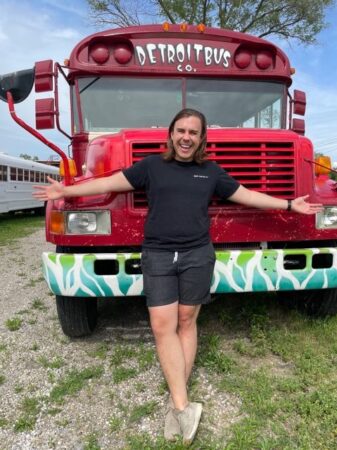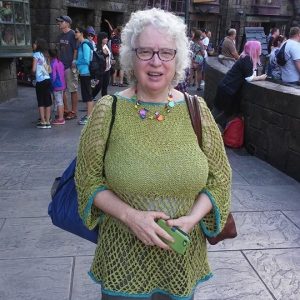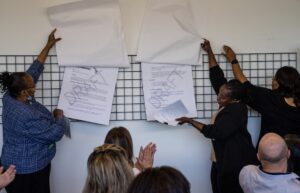Last winter while most of Michigan was shivering in place during the manifesting pandemic, entrepreneur Andy Didorosi made a whopper of a purchase. He bought a 55,000 square-foot abandoned factory on Detroit’s west side. That’s 2.5 acres. Almost as large as the University of Michigan Big House minus the stands.
This unconventional entrepreneur is the founder and CEO of The Detroit Bus Company, a hand sanitizer business and a bunch of side operations, it’s a chance to dream bigger dreams on a humongous canvas – the now-defunct F.M. Envelope, a custom envelope factory.
Cleaning up this old envelope factory will take tons and tons of time, effort, and materials. Everything is huge. One wall is 150 feet long. Next, we’ll use gloss white paint to make it look brighter,
says Didorosi, 35. His eyes sparkle, he skips as he tours the parking lot with four operational buses and another six he plans to put on the road, all splashed with intentional graffiti.
He is all set for Detroit to explode with post-pandemic promise and he’ll shuttle the recovery.
With restrictions lifting, reservations are flowing into the shop. The parked school buses will soon be rehabbed, painted, and
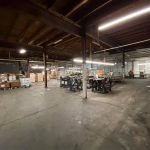
55,000 SQUARE FOOT DETROIT BUS COMPANY BUILDING. PHOTO MAUREEN MCDONALD
added to the fleet. But the neighborhood presents challenges. The neighborhood has a 43 percent poverty rate, neighboring streets and vacant lots are littered with dead vehicles.
Weeks after moving all his buses from a building in Corktown, vandals crept into this Livernois and Joy neighborhood, stole batteries and wiring harnesses out of most of the buses, and doing at least $5,000 worth of damage.
“Security cameras are going up now and we’re bolstering our fences,” Didorosi said. He ruled out a guard dog. “The dog next door hopped the fence and bounded into our place growling at everyone. He calmed down. He was lonely guarding a lot all day.”
Mending the emotional fences between poverty and productivity takes more work. The neighborhood where he rented a warehouse in Corktown improved so much the rent was out of reach. Forcing him to invest in property to avoid another massive rent hike.
The new building allows him to expand his community outreach. He started a Detroit Student Racing team for city kids. He and his friends mentor youth in turning a ’55 Buick Century Special into an electric race car. “The kids like it so much they have brought their dads to help out. They show up every week anxious to learn.”
Eventually, Didorosi plans to make a community meeting room and a coffee shop. He’ll have space for a makers lab where people can build robots, make art, and craft their own dreams. A crowdfunding campaign will commence soon. Reporters from media outlets around the country call him to include in stories about Detroit.
Three years ago, he crowdfunded enough money to buy over 100 electric scooters for city kids and gave them away at a Christmas party. He invited a Jeep motoring club to bring vehicles the kids could crawl on. And a hotdog vendor who served free food to the families attending. The kids were ecstatic, he said.
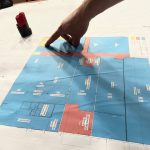
ANDY COMMISSIONED BEN CARR OF ALL HANDS ARCHITECTURE TO DEVELOP A PLAN FOR THE 55,000 SQ. FT. ENVELOPE FACTORY. PHOTO MAUREEN MCDONALD
Didorosi’s first project was a lemonade stand in his Harper Woods neighborhood. Sales were sketchy till he fished a red stop sign out of the trash. He put it up at the end of his stand, prompting people to stop, look around and get lemonade. He spied a bunch of roofers atop a school building at the end of the block, wheeled his cart there on a sweltering hot day, and sold out his entire inventory.
He bought Star Wars figures with the profits and cherished them. Some things are worth more than money, a mission he has followed through his career. As he grew older, he delivered pizzas, detailed cars, and used the money to buy a motorcycle shop. But it was too much work. It didn’t feed his passion, but he learned people management skills and supply chain economics.
I had an authority complex. I was expelled from first grade for refusing to listen to a boring teacher. I didn’t fit in at Notre Dame.
Nothing fit like business projects. He would have to be his own boss.
At age 22 his mother, a corporate litigator, asked him to help clear out the former Farmer Jack warehouse on Plymouth Road after the grocery chain went kaput. He used digital marketing and blasted the networks with the sale of signs, forklifts, shelving, and more. He made a tidy profit for himself and the Montreal company that bought the building.
The clearance sale gave him the cash to plop down on an upstart bus company in 2011. “We started a transit revolution,” Didorosi said. In the next decade, they were doing 12 to 15 party reservations a week. Didorosi invented a software system he called Farebox to track drivers, itineraries, clients, and more.
Just as profits began rolling along, he invested in more school buses, but the pandemic screeched everything to a halt. “We weren’t just losing money on all the future bookings we had to return $300,000 in deposits for all the trips we already booked.”
On the brink of bankruptcy, he had a brainstorm to address critical shortages of hand sanitizer. He got a recipe for hand
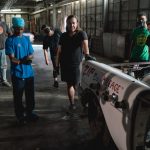
WORKING WITH KIDS AND CARS. PHOTO DEREK COOKSON
sanitizer from the World Health Organization. Mail orders flew in from around the country. He bought basic ingredients by tanker trucks, 7,000 gallons per order, and sold it in gallon jugs. Chinese companies undercut his profit margin, putting a lot of product on the shelves.
Indeed, the envelope factory offered extraordinary space to shelve and store sanitizer materials, bus parts, and tools. But doing the job himself was daunting. He tripped on a miter saw and sliced open his knee. One hour in the emergency room became months in pain and a mighty slow recovery. He is limping back in action again, wearing t-shirts he designed as a fundraiser for the Detroit Bus Company.
He is not alone in entrepreneurial magic. Take urban enthusiasts Matt Naimi and Jon Zemke.
Naimi has been reimagining Detroit since 2007 when he turned a former car factory in the city’s northwest side near Henry Ford Hospital into Recycle Here, a recycling center and events space. Next door he built the Lincoln Street Art Project on land that had been home to discarded mattresses and other detritus.
Offbeat parties could draw hundreds of people, some who stayed to spray paint graffiti on the walls.
With the help of a tribe of street artists they turned a junk car and recycled trash into a giant cockroach they drove to ArtPrize in Grand Rapids and the Marche du Nain Rouge in Detroit.
Despite brain cancer and medical challenges, Naimi is pushing ahead with a $20 million development, turning the factory into affordable housing for artists and performance space. He was able to get tax incentives for the units, and grants from the Detroit Housing for the Future Fund. The new project would retain the recycling operation and the Art Park while adding a market, a coffee shop, and more.
A couple of miles uptown, Jon Zemke of Zemke-Lukowski Properties, quit a thriving freelance writer business to rehab houses in Corktown. A decade into the business he owns a dozen up and running units and works on a dozen more. He recently completed LaFerle Terrace, a group of row houses that sat empty for more than 20 years. The decade-long project came to fruition, using local residents as helpers, bringing bottom-of-the-barrel blighted properties back to market-rate housing.
He is constantly on the prowl for more damaged properties to renew and release onto the tax rolls. He is getting a master’s in construction management to do better at estimating costs, hiring labor, and making a profit. He tithes a percentage to the Catholic Church and looks to his task as a religious calling.
This is a resurrection of sorts,” Zemke said. When it’s done right, people make the best long-term decisions for properties. They’d tear off all the old layers of roof and put a fresh one on top. They rebuild the front porches the way they were originally built that emphasizes the historic architecture and neighborly interaction. That’s rebirth.
Others might recall the famous advice of 19th century Chicago architect Daniel Burnham; “Make no little plans; they have no magic to stir men’s blood and probably will themselves not be realized. Make big plans; aim high in hope and work, remembering that a noble, logical diagram once recorded will not die.” “Make no little plans. They have no magic to stir en’s blood.”


